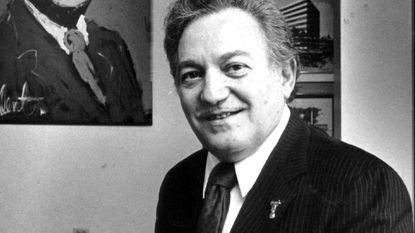Great frauds in history: Meyer Blinder's Blind ’em & Rob ’em
Meyer Blinder’s brokerage firm cold-called unsuspecting punters and pumped shares in fraudulent shell companies while stiffing them with huge commissions.


Meyer Blinder was born in New York in 1921. He worked in his parents’ sweet shop and then as a travelling salesman, later serving in the US Army during World War II. After the war he started various companies, including a coffee vending firm that was eventually sold for enough money to enable him to retire. In 1970, however, he set up the brokerage firm Blinder, Robinson and Company in Westbury, New York before moving it to Denver, Colorado eight years later. At its peak it was the largest penny stock brokerage in the US, and the tenth-largest broker overall, employing 3,000 people in 80 offices in America and other countries.
What was the scam?
Blinder, Robinson and Company was known for its “three call” method, where brokers would build up the client’s trust by calling them multiple times before making a recommendation. It would use these sales tactics to sell shares in fraudulent shell companies, which Blinder and his associates had set up, at inflated prices. Meyer’s firm would further cheat its customers by charging them up to 140% commission on every trade, far more than the legally allowed 10%, without telling them. All this allowed Blinder to amass a $100m ($196m today) fortune.
What happened next?
Mounting investor complaints attracted the attention of the authorities, with the US Securities and Exchange Commission charging him with fraud in 1986. Meyer refused to back down, arguing that the investors were responsible for their own losses, and initially managed to delay the trial. However, the firm, which had become known as “Blind ‘em and Rob ‘em”, was hit by a class-action lawsuit set up by two former customers. By 1990 it was forced into bankruptcy, with debts of over $75m. By 1992 Meyer was himself convicted of racketeering and money laundering and would serve over three years in prison.
Subscribe to MoneyWeek
Subscribe to MoneyWeek today and get your first six magazine issues absolutely FREE

Sign up to Money Morning
Don't miss the latest investment and personal finances news, market analysis, plus money-saving tips with our free twice-daily newsletter
Don't miss the latest investment and personal finances news, market analysis, plus money-saving tips with our free twice-daily newsletter
Lessons for investors
Prosecutors believe investors may have lost as much as $500m ($978m) from the various scams that Meyer was involved in. It’s always good to check the small print of any fund, scheme or brokerage service to see how much money you are being charged, and avoid those with high charges, because there is little evidence that high-cost services do any better than cheaper ones. It’s also a good idea to stay away from brokers or advisers who cold-call you (which is now against the rules in most cases in the UK).
Matthew graduated from the University of Durham in 2004; he then gained an MSc, followed by a PhD at the London School of Economics.
He has previously written for a wide range of publications, including the Guardian and the Economist, and also helped to run a newsletter on terrorism. He has spent time at Lehman Brothers, Citigroup and the consultancy Lombard Street Research.
Matthew is the author of Superinvestors: Lessons from the greatest investors in history, published by Harriman House, which has been translated into several languages. His second book, Investing Explained: The Accessible Guide to Building an Investment Portfolio, is published by Kogan Page.
As senior writer, he writes the shares and politics & economics pages, as well as weekly Blowing It and Great Frauds in History columns He also writes a fortnightly reviews page and trading tips, as well as regular cover stories and multi-page investment focus features.
Follow Matthew on Twitter: @DrMatthewPartri
-
 AstraZeneca CEO’s £1.8mn pay rise approved despite shareholder opposition
AstraZeneca CEO’s £1.8mn pay rise approved despite shareholder oppositionAstraZeneca hiked its dividend to persuade shareholders to accept CEO Pascal Soriot’s pay rise. Is he worth his salary?
By Dr Matthew Partridge Published
-
 IHT receipts hit record high – is it set to rise further?
IHT receipts hit record high – is it set to rise further?HMRC is set to collect a historic number of IHT receipts between April 2023 and March 2024. We look at how you can stop the taxman eating into your inheritance.
By Vaishali Varu Published
-
 Should your business invest in a VoIP phone service?
Should your business invest in a VoIP phone service?Here's what you need to know about VOIP (voice over IP) services before landlines go digital in 2025.
By David Prosser Published
-
 The end of China’s boom
The end of China’s boomLike the US, China too got fat on fake money. Now, China's doom is not far away.
By Bill Bonner Published
-
 The many frauds of Dozy Mmobuosi, failed Sheffield United owner
The many frauds of Dozy Mmobuosi, failed Sheffield United ownerProfile Dozy Mmobuosi was a big-hitter with a fintech empire when he stepped in to rescue a failing Yorkshire football club. But he was not quite the saviour he seemed.
By Jane Lewis Published
-
 What is the future of Royal Mail in the UK?
What is the future of Royal Mail in the UK?With fewer of us sending letters and parcels, the Royal Mail is finding dealing with the nation’s post is an increasingly unprofitable and costly business.
By Simon Wilson Published
-
 What's the secret of Manolo Blahnik's success?
What's the secret of Manolo Blahnik's success?Fashion maestro Manolo Blahnik shows little sign of slowing down at 81, and his company notched up a record financial year in 2022. What is the secret of his success?
By Jane Lewis Published
-
 Michelle Mone's "tough year of pain"
Michelle Mone's "tough year of pain"Michelle Mone liked to portray herself as a working-class heroine who worked her way to the top through grit and determination. But her pedestal is built on sand.
By Jane Lewis Published
-
 Trevor Milton, the Elon Musk wannabe, is jailed for fraud
Trevor Milton, the Elon Musk wannabe, is jailed for fraudThe former CEO of Nikola, Trevor Milton, has been found guilty of lying about the development of the company's electric trucks.
By Jane Lewis Published
-
 Directors should think twice before waiving limited liability
Directors should think twice before waiving limited liabilityShould small-business directors ever provide a personal guarantee in return for bank finance?
By David Prosser Published